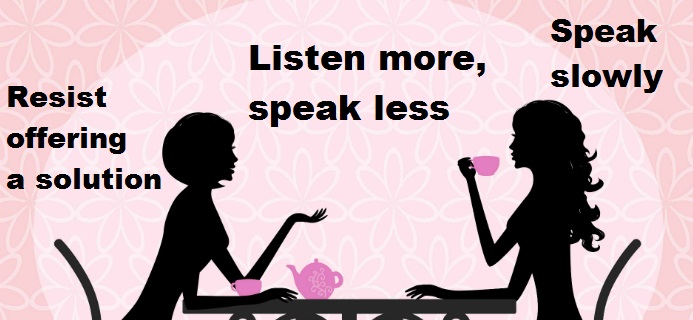Ever question your conversation habits? The speed you speak, your breathing and your words not only affect how you come across, but also your own stress levels and those of the person you’re speaking to. Nutritional therapist and yoga teacher Charlotte Watts reveals the three ways to de-stress your conversations
Whether you spend lots of time around people or tend to hide away, at some point it’s likely you’ll be exchanging words and opinions with another of your species. These meetings can range from joyous to neutral to downright difficult. Sometimes that is led by external circumstances, but we always have a choice in how to put across information and how we respond to what’s being said.
When we’re stressed, het up or panicking, we tend to speed up talking and the pitch goes up
A large part of the success of human beings to colonise and dominate has come from our incredible abilities to socialise and co-operate. We are able to do this by suppressing natural urges, something other animals do not do unless domesticated. Maybe some part of you wants to leap in a feral fashion across the meeting room, but instead find yourself saying ‘I’m not sure I agree with that viewpoint’ whilst wrestling with a knotted feeling inside. It keeps society moving fluidly (most of the time), but can sometimes feel like a powder keg waiting to blow.
As we deal with more and more people and increased communication demands, we can feel as hemmed in by our communications as we do with any other circumstance. When frustration, worry and fear is also coming out in the way that we express and react, stressful speech habits can create ripples back to us as we project our stresses out to others. They bat them back to us and a volley of ever-increasing agitation can ensue.

trusted to come up with a reflective answer
A few simple mindful communication practices can be called on to pay attention to what we’re putting out. These help give us the space to say what we really feel, rather what we just think in a knee-jerk momentary reaction. That way we’re not just dealing with the backlash of things we may not have meant later and the whole business of being around other beings can feel more pleasant and graceful. The more we come back to these, the more they become our usual methodology and coping strategies.
-
Speak slowly
When we’re stressed, het up or panicking, we tend to speed up talking and the pitch goes up. Everything gets ramped up to high-energy, high-pressure like speeding up a voice recording. Remember that phrase ‘only dogs can hear you now’? That’s the fight-or-flight response whipping you up for a strong physical reaction and mentally that means we feel pressure to get our point across – immediately and in a more shrill voice.
Speaking in a slower, deeper voice has more gravitas (think Lauran Bacall) and your whole nervous system will also hear that things are ok, you’ve got this one
This type of communication is great if there’s a fire and we need people to respond right now to save their lives, but outside of that level of urgency the fast, high-pitched voice can sound more like we’ve lost control and maybe can’t be trusted to come up with the most reflective and considered answer. When we most want people to listen is the time we might be saying things they simply can’t hear.
the fast, high-pitched voice can sound more like we’ve lost control
Delivery and style are everything. If you actively slow down your breath, your speech can follow so your content can be received on fertile ground. Taking a few deep breaths and even sighing out (which we feel ourselves doing as a pressure release) can allow you to drop into saying what you need with space for others to hear. From here we can let go of the fear that if we don’t say it quickly we’ll be interrupted. Speaking in a slower, deeper voice has more gravitas (think Lauran Bacall) and your whole nervous system will also hear that things are ok, you’ve got this one.
-
Listen more, speak less
As the inimitable Winston Churchill said, ‘Courage is what it takes to stand up and speak; courage is also what it takes to sit down and listen.’ When a conversation consists only of people waiting their turn to jump in and get their say, there is no room for anyone to actually be heard. If we’re simply waiting whilst we prepare what we want to get across, we have already assumed what the other person is going to say or have dismissed it as unimportant. Would we want to be treated like that?

allows space for others to register what you’re saying
In conversations where the stress ante is upped, this imperative to be heard and control the outcome can be overwhelming. We can easily become mind-locked into well-trodden thought paths and lack the adaptation and flexibility to entertain new ideas or another’s point of view – especially if they’ve annoyed us.
Winston Churchill said, ‘Courage is what it takes to stand up and speak; courage is also what it takes to sit down and listen.’
Allow others to speak whilst listening and being fully attentive to their thoughts and feelings takes dedicated effort. It is absolutely natural for our minds to wander off when others are speaking or go of on our own tangents internally in response to a detail in the conversation. We can smile at this tendency and then give the level of kind attention we would like – then we’re more likely to receive it back.
-
Resist offering a solution
This one’s a toughie for those of us who like to lead and control! When we’re listening to others, it’s very easy to be looking for the fix instead of truly listening. But ask yourself, when you are relaying a problem or describing a situation, how often are you really actually wanting another opinion? Sometimes we are and if so we might say, ‘what do you think?’ But so often we are simply wanted to be listened and to glean some empathy and understanding.
Practice accepting that sometimes people need to just speak and be heard; they are often not asking for a solution
Talking about aspects of our lives helps our language-based brains process the events by hearing the narrative from our inner world become external. We often find ourselves talking out loud through different possibilities and outcomes, playing and feeling them out. Gauging other’s reactions is a key part of this process and that is not necessarily what we should do, but what are the ethics, boundaries and subjective truths of the matter. That helps us make sense of what to do within our own belief systems, not always what a good friend or family member would do, but what sits right.

need to just speak and be heard
So when we listen to others working out their stuff out loud, remember how you sometimes just need to hear it out loud and have it listened to. Practice accepting that sometimes people need to just speak and be heard; they are often not asking for a solution. We can join in and ask questions, especially about how they felt to help them along if they need. They will definitely ask for your opinion if they want it!
We all know how stressful and upsetting it can be to be barked at, not listened to and told how we should be doing things. Some empathy for ourselves can spread out communication styles that come back to us and that makes our world a happier place to be.
More from Charlotte Watts
Which stress suit do you wear?
Stressed out? The secrets to dealing with it are in your BELLY – our blogger has 7 ways healing your gut can heal your head
5 office exercises to up your energy at work
10 ways to deal with stress and anxiety you’ve NEVER heard of
7 surprising signs you’re stressed
6 ways to have more energy through the day

. She has also authored The De-Stress Diet (with Anna Magee), 100 Top Recipes for Happy Kids, 100 Best Foods for Pregnancy and 100 Foods to Stay Young.
Try a calming retreat with Charlotte? Charlotte teaches regular retreats in the UK and abroad, see more details here.
Special Healthista offer on Charlotte’s next retreat on 27-31 August 2015, a Yoga and Mindfulness Retreat at the amazing Mill Retreat Centre in Normandy. Exclusive for Healthistas, get a free copy of Charlotte’s book The De-Stress Effect with each retreat booking. Email info@charlottewattshealth.com to book.
Like this article? Sign up to our newsletter to get more articles like this delivered straight to your inbox.





















































